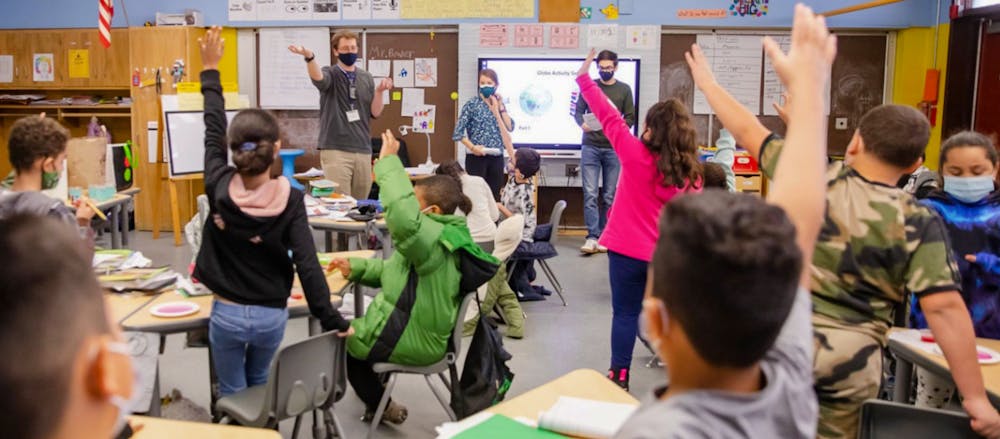The Providence Public School District is adopting in-person learning for the remainder of the school year, Governor Dan McKee announced Dec. 29. Since the start of the pandemic, COVID-19 has been disrupting schooling across the country, leaving local educators, health experts and community members alike to confront the challenges COVID-19 continues to pose to local schools.
Philip Chan, RIDOH consultant director, associate professor of medicine at the University and Providence parent, sent his kids back to school for in-person learning as soon as the opportunity was presented in September 2020. PPSD’s COVID-19 management posed no issue for Chan and his family.
“Based on our experiences in Rhode Island, the schools have generally been safe and done well,” Chan said. “I’ve worked with some of the schools in my role with the Rhode Island Department of Health and we’ve been very aggressive about COVID mitigation.”
Chan explained how the Rhode Island Department of Health is working with PPSD schools to confirm that their ventilation is up to date, advise them on masking, draft requirements for in-person learning, host vaccine question forums and set up vaccination clinics accessible to students and faculty.
“Schools themselves have come up with different COVID mitigation protocols” such as student pods, Chan said. “I feel like the schools have been very thoughtful about their approach, including the Department of Education.”
“In general, we are seeing a decreased in-person transmission in K-12 schools,” he added.
Chan’s confidence in the PPSD community to safely manage public health concerns was echoed by Eizabeth Goldberg, associate professor of emergency medicine and fellow PPSD parent, in a Wednesday virtual panel discussion with Providence teachers, public health experts, parents and students. The panel, hosted by the Annenberg Institute for School Reform, discussed how to best strategize against community health concerns, especially in light of the rise of the Omicron variant.
During the panel, Goldberg shared how PPSD began offering students optional weekly PCR testing in order to more closely monitor cases and regulate COVID-19 transmission within schools.
“My kids are in elementary school in Providence public schools,” Goldberg explained. “Every Thursday, they’re taken out of their classroom, they get a PCR test and then we’re notified of the results and proceed accordingly.”
PPSD is expecting to further enhance COVID-19 precautions, having received a RADx-UP grant that will allow testing to become more accessible to the PPSD community, particularly marginalized communities within Providence. RADx-UP grants are part of a National Institutes of Health initiative which aims “to ensure that all Americans have access to COVID-19 testing, with a focus on communities most affected by the pandemic,” according to the RADx-UP mission statement.
“The grant will help us with improving vaccine uptake and testing for COVID among underserved populations,” Goldberg said. “They’re working with Progreso Latino, a community organization that works with Hispanic folks in our community to try to understand what is important to Black and brown people in our community surrounding COVID.”
Goldberg shared that an immediate goal of PPSD is to extend resources to marginalized communities within the district to counter the disproportionate infection and death rates they have experienced.
“We know that Black and brown folks have had higher rates of COVID, severe COVID and deaths due to COVID but have had lower rates of vaccine uptake,” Goldberg said. “And we’re seeing that play out in our schools. Providence Public Schools is over 90% Black and brown students, and these students have had a lower vaccine uptake than predominantly white suburbs in Rhode Island.”
Accessibility in Providence extends beyond just vaccines, as Soljane Martinez, education coordinator at the Annenberg Institute, said.
“Allocating resources throughout all of this has been a huge catalyst for things falling into place,” she said. “If your resources are allocated strategically and equitably, students will have a better time.”
Martinez also addressed the accessibility barriers that have posed limits on some students’ ability to learn during the pandemic.
“Even before we got students completely face-to-face, PPSD was providing hotspots and devices for families who had access issues,” she said. “We have a lot of students and communities who simply didn’t have access to technology.”
The Rhode Island Department of Education’s Learning, Equity & Accelerated Pathways task force, launched in February 2021 to address this issue, as well as others. The task force has been able to identify and strategize against key factors of COVID and online school-related learning loss.
The task force “developed research-based strategies and practices that are equitable to help us recover that learning loss for our students,” Martinez said. “They established some really strategic priorities for the state and searched for resources that could help the state implement strategies.”
On top of addressing learning loss and preventing COVID outbreaks, PPSD has also begun spending additional time addressing mental health issues across its schools. PPSD schools that were once without guidance counselors are now seeing positions become filled, especially in elementary schools.
“Schools that previously didn’t have counselors … to deal with this mental health struggle and (the) social and emotional wellbeing of students were struggling,” Martinez said.
Cynthia Torres, the principal of Providence’s Reservoir Avenue Elementary School, said that while her school had just gotten a guidance counselor this year, they are still looking for more resources to expand the role to help more students. “It would be better if we could get one full time, but we are working on getting those resources,” Torres added.
The Annenberg Institute has joined efforts to assist in hiring professionals for understaffed schools.
“There’s been a lot of traction through our Center on the Study of Educators at Annenberg,” Martinez said. “They partnered with the district to help them look at their recruitment and hiring strategies, … and there was some really significant progress in terms of the applicant pool that was received.”

Sofia Barnett is a University News editor overseeing the faculty and higher education beat. She is a junior from Texas studying history and English nonfiction and enjoys freelancing in her free time.





